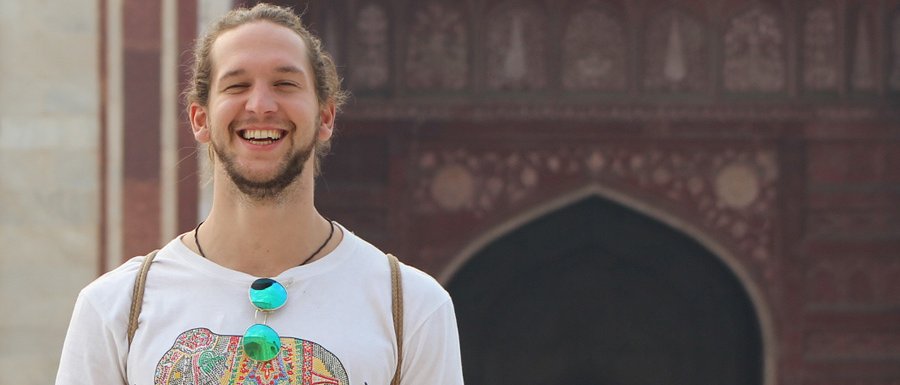An internship at the Ganges in India:
The most important lesson: Patience

TUMstudinews: How did you come across the project “Support to Ganga Rejuvenation (SGR)”?
Simon Lutz: The Society for International Cooperation (Gesellschaft für Internationale Zusammenarbeit, GIZ) is always looking for German students who would like to participate in this long-term project as an intern. The internship office was promoted in my Master’s course “Flood Risk and Flood Management” at TUM. I thought it sounded really exciting, so I decided to apply for a 6-month internship in Delhi.
What exactly is the SGR project about, and what were your tasks?
The project focuses on rejuvenating the Ganges. More than 40% of the Indian population live in the drainage area. The idea is to enable a German-Indian exchange of knowledge and to gather practical experience in rejuvenating rivers. The SGR-team organized several workshops with experts from Europe for the persons responsible in India, for which I did the content-related preparation and follow-up work. My other tasks were to write, evaluate, and correct reports, to translate documents, create presentations, and organize meetings.
Sounds like quite a demanding job.
At the beginning of my internship, I assumed that the rejuvenation of the Ganges would be an immense task – but the issue can be solved in the medium term, because there is sufficient knowledge about how to rejuvenate a river in Europe, and especially in Germany. However, I was overwhelmed by the complexity of the project, making me have to focus on the bare facts. The Ganges is not only a river that flows through eleven Indian states; it is also of significant importance for tourism, the industry, agriculture, and, of course, the religion of the Hindus. For them, the river is sacred. There are a lot of interests involved, which must be taken into account as well.
What kind of experiences or knowledge did you gather in India?
The internship enabled me to get an insight into the working world of an engineer. I was surprised to see how much of the daily work has to do with project management, communication, and getting an understanding of the state structures. My most important lesson, however, was to be patient and accept that some things just need time in India. Patience is a virtue, and the people in India are masters in this respect – something we, the often stressed-out Europeans, should take as an example.
What did you like most about India?
So far, my time in India was my most interesting and best experience ever. The Indian culture is incredibly multi-faceted, absolutely unique – and so is the richness of the landscape: from the breathtaking mountain scenery of the Himalayas to the paradisiacal palm beaches of South India … and the jungle, the highland, deserts, marshes and the savannah in between. I also lived in New Delhi, where I got to know expats from all parts of the world. You celebrate together, travel together, help each other to find a suitable apartment, and you get to know countless other cultures as well. I would always do it again.
Simon Lutz (25) is from Oettingen, Donau-Ries. Currently, he is in his second Master’s semester of Environmental Engineering, in the scope of which he focuses on “Environmental Hazards and Resources Management”.
- Next to the usual possibilities for student exchanges (Erasmus & TUMexchange), the TUM’s International Center offers several different possibilities to take the step abroad. For example, it offers advice regarding possible funding or international internships – within Erasmus+ or independently organized.
- The Liaison Officers at the TUM’s international locations (Brussels, Cairo, Mumbai, Beijing, San Francisco, and São Paulo) are able to pass on information about possible internships to the respective faculties – to ensure that as many students as possible can make exciting experiences like Simon Lutz.
More information:
TUM Global News